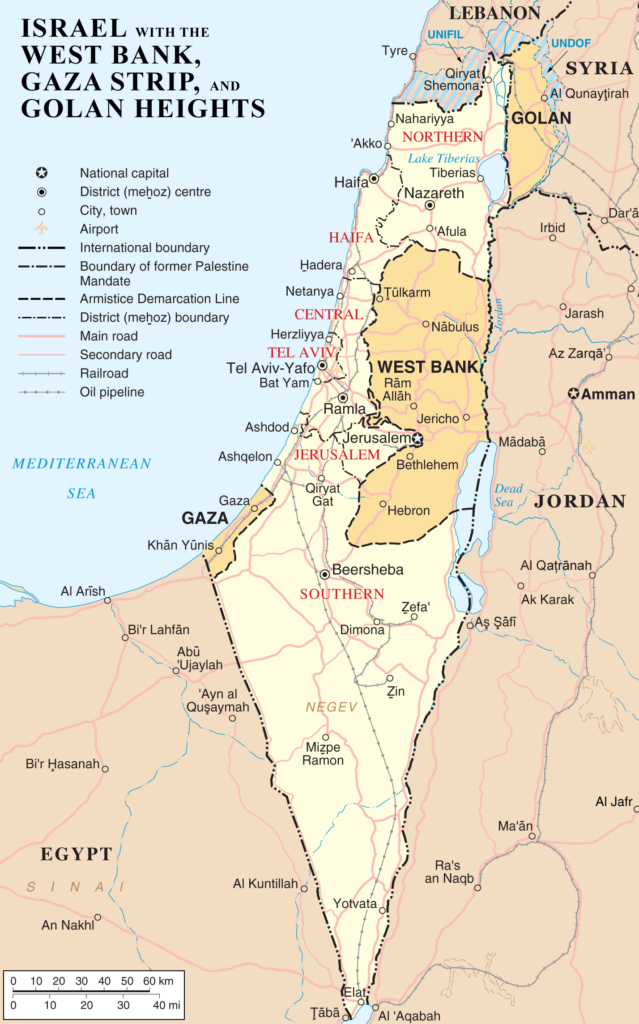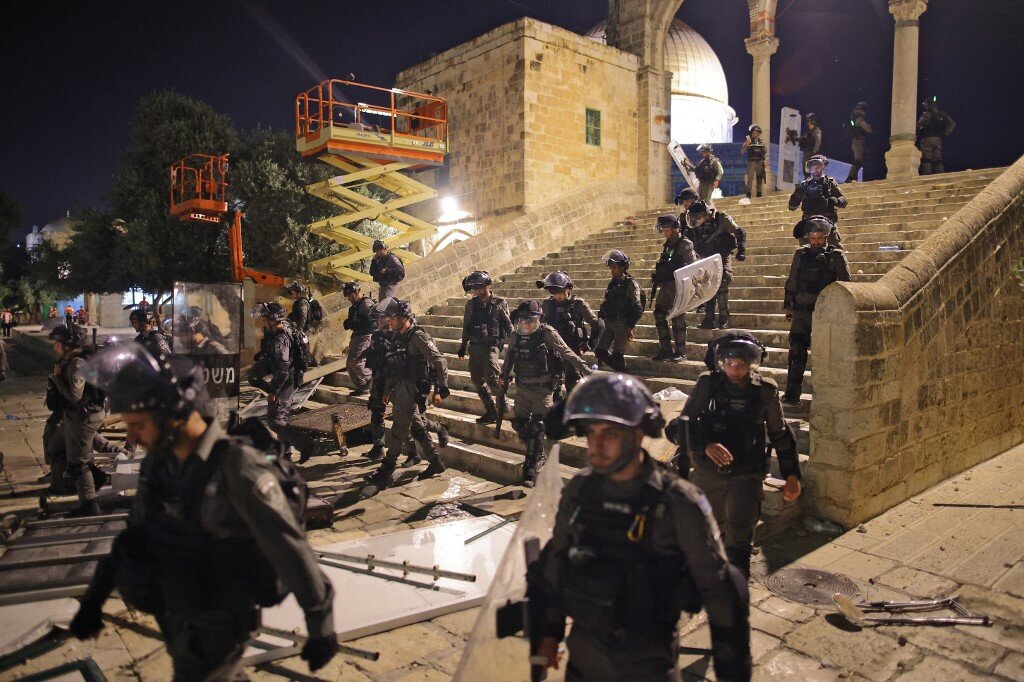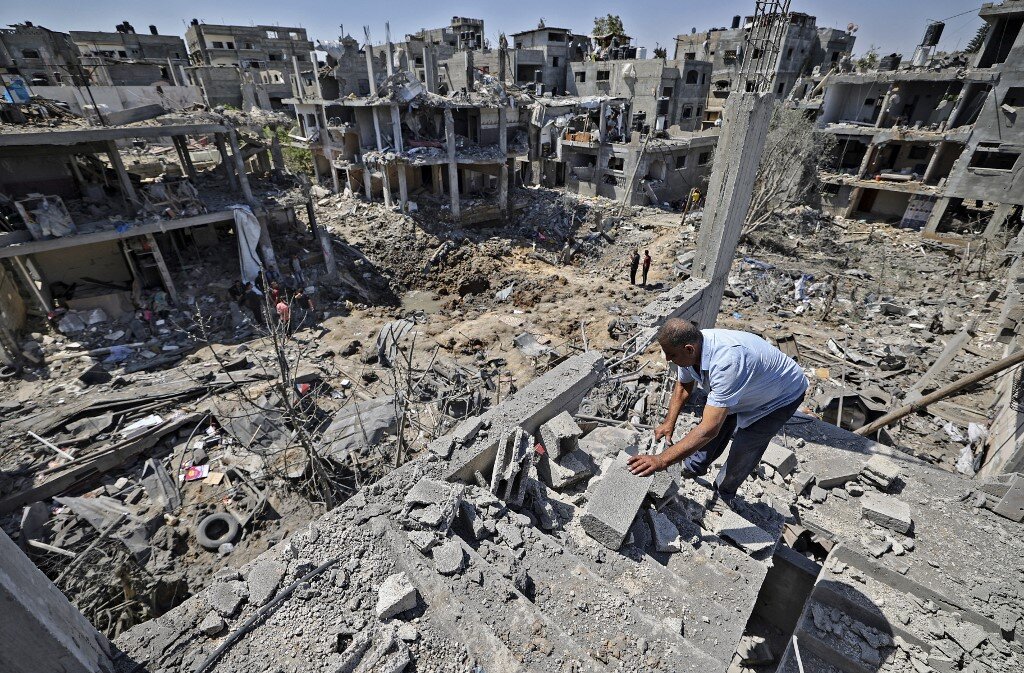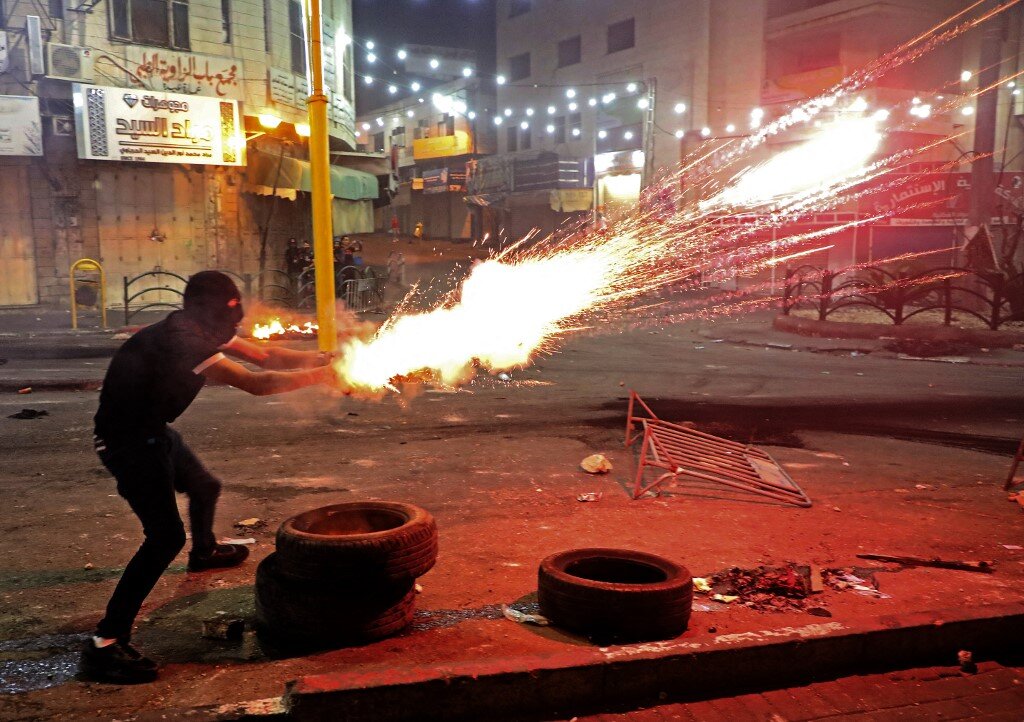Editor’s Note: This story has been updated to provide official number of Ukrainians currently in the Gaza Strip, as reported by Ukraine’s Foreign Ministry.
Thousands of Ukrainians in Israel and 1600 in the Gaza Strip are now stuck in the epicenter of the decades-long conflict between Israel and Palestine, which rapidly escalated over the last week, with missile strikes killing hundreds of civilians.
Ukraine’s Foreign Ministry said that 120 Ukrainians hoped to be evacuated from Gaza, and the embassies are working on it. No Ukrainians were reported killed or injured.
The bloodshed kicked off when Hamas – an Islamist terror group in control of Gaza – launched 200 rockets towards Israel, angered by Israeli police violence and evictions of Palestinian families from Sheikh Jarrah, a neighborhood in East Jerusalem. Most rockets are being intercepted by Israel’s aerial defense system, the Iron Dome, as the country retaliates with airstrikes on Hamas quarters in Gaza.
Endless fighting has left 10 Israelis and at least 200 Palestinians dead, with no ceasefire in sight.
As some Ukrainians plea for evacuation, others scramble to save what’s left from their explosion-struck homes.
Conflict reignited
The second week of May was a time of particularly high tensions in Jerusalem, home to some of the world’s holiest sites – Temple Mount for Jews and al-Aqsa mosque for Arabs.
Traditionally, the Israeli-Palestinian conflict intensified because Jews and Arabs are dividing the land.

A map of Israel with its key cities showcasing Palestinian territories, as well as the neighboring countries – Egypt, Jordan, Syria, and Lebanon.
In the predominantly Palestinian neighborhood of Sheikh Jarrah, two kilometers north of Jerusalem’s Old Сity, four Palestinian families are fighting eviction by Jewish settlers. The land on which these Palestinian homes sit was owned by Jews before 1948 when neighboring Jordan occupied that part of Jerusalem.
The Palestinian families, who have lived in these houses since 1957, were resettled there by the United Nations Relief and Works Agency after the Battle for Jerusalem in 1947-1948. Then-mandated by Britain, Palestine, Israel, and Jordan all fought to gain control of Jerusalem, destroying many homes and turning locals into refugees. Many Palestinians have since been resettled to newly-built homes in Sheikh Jarrah.
Israeli laws allow Jews to claim property rights if they can prove their ancestors owned the land in the past. But Palestinians, who also have lived on now-Israeli land for decades, don’t have such rights. As Jews reclaim their historic ties to the property, at least 36 Palestinian families face similar evictions.

Israeli security forces deploy in Jerusalem’s al-Aqsa mosque compound on May 10, 2021, during clashes with Palestinians. (Photo by Ahmad GHARABLI / AFP)
Tensions soon led to confrontations between Arabs, Jews, and Israeli law enforcement, which skyrocketed when Israeli police stormed the al-Aqsa mosque, where thousands of Palestinians gathered to celebrate the end of the holy month of Ramadan and protest against Jewish settlers on May 10th. The police said they were trying to disperse the crowds which were throwing stones and fireworks.
Some 330 Palestinians and 21 police officers were injured. Hours later, Hamas fired hundreds of missiles into Israel for the first time in seven years, and Jerusalem struck back.
Since then, thousands of rockets have been flying through the skies of Gaza and Israel.
Wasteland in Gaza
“How does one live through such fear?” says a Ukrainian man living in Gaza, his voice trembling.
He asked for his name to not be published for security reasons.
Gaza, the Palestinian territory, has suffered massive destruction of homes and infrastructure from Israeli airstrikes. Israel Defense Forces say they carefully target Hamas’ quarters, but terrorists allegedly hide in densely populated civilian areas, which makes civilian casualties unavoidable.

Palestinians assess the damage caused by Israeli air strikes, in Beit Hanun in the northern Gaza Strip, on May 14, 2021. – Israel pounded Gaza and deployed extra troops to the border as Palestinians fired barrages of rockets back, with the death toll in the enclave on the fourth day of conflict climbing to over 100. (Photo by MAHMUD HAMS / AFP)
“We don’t have electricity nor water, the internet is very weak, as you can see,” the man says, after nearly 10 failed attempts to call a Kyiv Post reporter due to an unstable internet connection, finally recording an audio message instead.
To him, every day in Gaza is a game of Russian roulette.
“We’re bombed everywhere, and no one knows whether they are going to get injured, or killed any minute,” he says. “The entire city is ruined.”
Israel has launched more than 1,000 missiles into Gaza, wounding over 1,300 and killing at least 200 Palestinians, including 59 children. Israeli forces also reported striking at least 820 terror targets, reportedly killing 130 terrorists.
“We are running out of food at home,” said Maryna Alastal, a Ukrainian who married a Palestinian and moved to Gaza years ago.
She says her family can’t buy any groceries because all stores are closed and it’s too dangerous to go outside.
“The center of Gaza was turned to ashes,” Alastal told the Kyiv Post, referring to damage from airstrikes.
At least 120 Ukrainians pled to be evacuated from Gaza, a spokesperson for Ukraine’s Foreign Ministry Oleh Nikolenko told Hromadske news outlet on May 15.
“The embassies in Israel and Egypt, as well as the representative office with the Palestinian national administration, are working on possible routes for repatriation,” he added.
Seconds to hide
“Many say you get used to this… but no, it’s impossible,” says an 82-year-old Malvina Mirymska, as she bursts into tears trying to narrate how missiles of Hamas hit neighboring streets.
Mirymska lives in Ashkelon, just 13 kilometers north of the border with Gaza. Multiple yards and balconies in her neighborhood were destroyed by Hamas rockets.
Hamas has launched nearly 3,000 rockets into Israel, mostly into its southern region, close to the Gaza Strip. Ninety percent of attacks have been intercepted by the Israeli Iron Dome, a powerful aerial defense system that targets missiles in the sky and shoots them down.

The Israeli Iron Dome missile defence system (L) intercepts rockets (R) fired by the Hamas movement towards southern Israel from Beit Lahia in the northern Gaza Strip as seen in the sky above the Gaza Strip overnight on May 14, 2021. (AFP)
A few rockets reached Ashdod, Ashkelon, and other parts of mainly Southern Israel, killing ten Israelis, including two children.
On May 16th, a missile from Gaza hit a synagogue in Ashkelon, close to Mirymska’s house.
“It punched a hole in the wall, but not a single book in the building was destroyed… sometimes, miracles happen,” Mirymska said.
“The situation in Israel, especially in the south, is very tense, although this situation is not new for the Israelis,” Arthur Shih, a Ukrainian living in Ashdod told the Kyiv Post.
Israel and Palestine have been fighting for decades, “but this time everything is different,” Arthur says.
When missiles approach Israeli cities, sirens ring and people have a minute or so to hide in shelter. Modern houses have built-in concrete shelter rooms, but many older apartment buildings don’t. In those, people are advised to stay on the stairwells between the floors.
Some shelters are stand-alone buildings, and those can be problematic to reach, especially for the elderly.
“My relatives in Beer Sheva (in Southern Israel) are subject to much more shelling and it is more difficult for them because they are old and it is not easy for them to jump up and run to the shelter like this,” Denis Dlugach, a Ukrainian in Tel Aviv told the Kyiv Post.
He says a lot of people suffer not from rocket hits, but from falls or blows while trying to run away, or from heart problems that get worse when the siren sounds and they need to run quickly.
Distance from the Gaza border affects how much time someone has to reach shelter. Residents of cities closest to Gaza only have 15 seconds.
Some days Israelis get sirens 6 to 10 times a night, according to Viktor Vertsner, a Ukrainian who moved to Tel-Aviv in the 90s, like many others did. Over the years, Vertsner’s 13-year-old daughter has gotten used to the sirens, missiles, and sudden explosions.
Chaos in the streets
As governing authorities in Israel and Gaza engage in warfare, Israeli cities become increasingly unsafe.
“Every night there are pogroms, lynchings, arson, beatings, and violence both by the Arab and Jewish populations,” Shih told the Kyiv Post.
Angry mobs of Arabs and Jews attack restaurants, hotels, and even automobiles driving by, sometimes pulling out drivers and beating them up. The riots have gotten so bad, some media outlets have referred to the unrest as the worst street violence Israel witnessed since its founding in 1948.

A Palestinian protester launches flares amid clashes with Israeli soldiers in the city center of Hebron in the occupied West Bank, following a rally for Fateh movement supporters denouncing the Israeli Gaza attacks and supporting Palestinians of Jerusalem, on May 14, 2021. (AFP)
But there are some humane episodes amidst the chaos.
On several occasions, Arabs tried to extinguish fires in burning synagogues and saved Torah scrolls from the flames. They also warned Jewish drivers that there was a crowd ahead that was about to attack them.
Similarly, Jews hid their Arab employees when Jewish radicals were planning to attack.
“To be blunt, there is war right now,” the man in Gaza said to the Kyiv Post. He has been keeping in touch with a Ukrainian representative in Palestine, hoping to arrange an evacuation for his fellow Ukrainians.
“We are completely innocent,” he said. “We are just people trying to live.”
